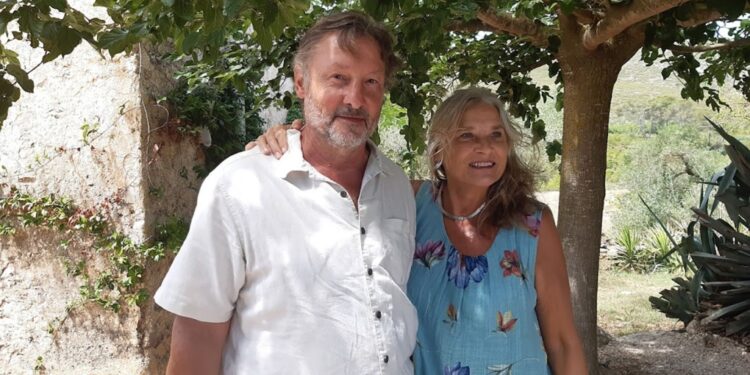“We had horses when we lived in the U.S., and we knew we wanted to have horses again,” says Regina.
“So that’s why a place with land was attractive to us. And plus, we’re in sort of a nature-zone area.
“For us and what we wanted to do, it was just the perfect setting, even though it was in Catalonia, which has its own language and wants to break away from Spain.”
While the house “was in really good shape,” the Zdravichs went on to spend around 10,000 euros (about US$11,187) on renovation work, and a further 15,000 euros on a new solar power system.
“We’re actually on the River Ebro, which the Spanish might not think is that big of a deal,” says John.
“But in the United States, to be living on a major river is, even though I don’t fish anymore, it’s nice.”
 The couple moved to Spain in 2018, and ended up living in a town along the River Ebro in Catalonia. (Regina Zdravich via CNN Newsource)
The couple moved to Spain in 2018, and ended up living in a town along the River Ebro in Catalonia. (Regina Zdravich via CNN Newsource)
One of the biggest struggles they say they’ve encountered since relocating has been learning the language, particularly now that they’re in Catalonia, which has its own language, Catalan – as well as its own parliament and flag.
The autonomous region held a referendum for independence from Spain back in 2017.
“Sometimes we get mixed up… They speak Catalan, especially in these small towns,” says Regina. “They want to hang on to their Catalan language.
“And we need to know Spanish because all of the official stuff that we have to do is done in Spanish…
“The fact that there is a second language here, has made our progress a little bit slower I think.”
John points out that many of their friends in the country are retirees from England, which hasn’t helped matters.
“We do take language classes,” he says. “But since we don’t work, we speak English to each other (all the time).”
Another aspect of living in Spain that Regina finds difficult is the use of the metric system.
“I’m baffled,” she admits. “Recipes baffle me because I just can’t get my head wrapped around it. I’m finally getting used to the temperature.”
Affordability factor
The couple, who now have long-term residency cards, have found Spain to be much more affordable than the U.S., particularly when it comes to eating out.
“Sometimes it’s almost like you can’t afford not to go out to dinner,” says John. “Because it’s so affordable.
“And if you don’t like wine, you’re in the wrong place. Because wine here is excellent and it’s affordable.”
The Zdravichs are also full of praise for the country’s “amazing” public healthcare system.
They say they bought a private health insurance policy during their “first couple of years” in Spain, but were then able to register for healthcare after providing their residency documentation and health records.
Catalonia has its own public health system, which can be accessed by any of its residents.
“John had to have back surgery, we didn’t pay a penny,” says Regina. “You go and you buy a prescription, and you can use your pocket change.
“In the U.S., it’s just insane how expensive health care is. And here it just isn’t.”
According to Regina, the couple save a lot of money each year on her asthma medication, which wasn’t covered by her health insurance in the U.S.
However, there are some things that are more expensive in Spain.
“We pay more in income taxes in Spain than what we do in the United States,” she says. “But I feel like we get a lot for it… The roads are in perfect condition. There’s a lot of social type services if you need them.”
Although they’ve also found fuel to be more costly in Spain, the couple say that they drive shorter distances now, so this hasn’t impacted them massively.
“Going out to do things is way less expensive than what it is in the US,” says Regina. “So overall, it’s a lot cheaper to live here.
“Living in the U.S. on the money that we have, I think it would be a little more tricky.”
The Zdravichs have only returned home a few times since relocating to Spain permanently and say that, while they miss their friends, they don’t miss living there.
“America’s pretty much gone off the deep end right now,” says John. “We watch the evening news every night, and you just sit there and you go, ‘It’s getting crazier and crazier.’”
They have no desire to return permanently, and say they keep their visits to a minimum as they find travelling long distances particularly gruelling nowadays.
When reflecting on their unsuccessful attempt to obtain residency for Italy, the couple now feel that things might have turned out differently if they’d hired an immigration lawyer.
In fact, they say they’d advise anyone attempting to relocate to a new country permanently to use one, provided that they “have the money to be able to do that.”
“We did it all on our own, and it was an awful lot of work,” says Regina. “There’s a lot of documentation you’ve got to pull together… You have to be organized.”
Although they were “very, very disappointed” to have to give up on their Italian dream in 2018, the Zdravichs are now very happy in Spain and remain in touch with the former exchange student who first introduced them to the idea of living in Italy.
“We had our hearts set on Italy,” says Regina. “But in hindsight, I think it might have worked out better.”
Source link : http://www.bing.com/news/apiclick.aspx?ref=FexRss&aid=&tid=66f5b276f6784c9c826ec3eccc765ebf&url=https%3A%2F%2Fwww.ctvnews.ca%2Flifestyle%2Fthis-u-s-couple-relocated-to-italy-after-retiring-it-didn-t-go-according-to-plan-1.7053203&c=14615635441078744417&mkt=de-de
Author :
Publish date : 2024-09-26 10:51:00
Copyright for syndicated content belongs to the linked Source.


